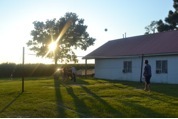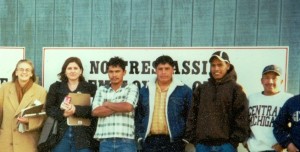The Good Camp
 Tuesday, June 10, 2014 at 9:26AM by
Tuesday, June 10, 2014 at 9:26AM by  Amanda Soltes
Amanda Soltes

Photo credit and guest post by Michael Durbin
Last summer I accompanied Student Action with Farmworkers (SAF) interns doing educational and health care outreach at migrant farmworker camps. The camps were generally dismal places, run down and ill-maintained and no place I’d ever want to spend the night. Except for one.
It was mid July. Hot. I had been in the car with Julie King and Danny Guzman-Ramos for the better part of a day, our shirt-backs sticking to the seats, following leads to camps where they hoped to register OSYs (Out of School Youth) for classes.
It had not been a fruitful day. After several hours of hop scotching the South Carolina blacktop, Danny and Julie had managed to register a grand total of one worker living in a trailer with failing siding, surrounded by a yard littered with garbage.
It was a common site. The front porch of another camp was strewn with beer cans, dirty laundry, and filth. At another place, a courteous but uninterested farmworking mom spoke to Danny through a screen door with holes big enough for birds to get through. On other days I had seen much worse.
Danny and Julie decided to ditch the rest of their leads. They would go instead to a peach grower’s camp they had already picked clean of OSYs, this time to interview a farmworker for their documentary project.
The decision changed everything. For the first time they were genuinely excited and I wondered why.
I could tell this camp was different as we rolled to a stop at the end of a long gravel road, the last few pebbles crunching under our wheels. The expanse of grass surrounding the squat white building was the first I’d seen at a camp that qualified as an actual lawn. It wasn’t fancy but had clearly been mowed. And there wasn’t a spec of litter in sight.
Danny and Julie were met by a pair of men with smiles that wrapped their weather-worn faces. I couldn’t follow the rapid Spanish but the body language was clear: These people were happy to see one another.
While Danny went inside to recruit someone to interview, Julie headed to the volleyball net. Volleyball? Within moments she was punching the ball to a guy on the other side, who lost sight of it in the glare of a warm sun now falling toward the peach trees surrounding the camp. He laughed.
I saw things I hadn’t seen at other camps: A pair of washing machines on a covered porch—they looked new. Parallel rows of clothes lines, draped with shirts and pants, rocked in unison by a warm, lazy breeze coming off the orchard. Two workers sat on their tractor, watching the orange sun now kissing the tops of the trees, enjoying the simple passage of time in a gorgeous setting.
The interview went off without a hitch and was followed by nearly an hour of friendly banter inside a screened in porch. I followed what I could of the conversations and took in what I could see: Clean tables. A swept floor. A bright clean kitchen with a professional stove—a Viking, the kind you see in restaurants.
I wonder what moved this grower to provide such decent housing, to spend what was clearly more than necessary to give these men a decent place to return to after a day of hard labor.
One factor was their immigration status. They were on H2A guest worker visas and the government requires housing to meet minimal standards from growers—standards too often ignored and unenforced.
I expect this peach grower went above and beyond H2A housing standards. Not every camp requires a Viking stove or even a volleyball net. But every farmworker is a human being with no less dignity than you or me. They all deserve a clean and well-maintained place to eat, to bath, to sleep.









![Private property with dog[1]](http://lawatthemargins.com/wp-content/uploads/2014/01/Private-property-with-dog1-300x211.jpg)


